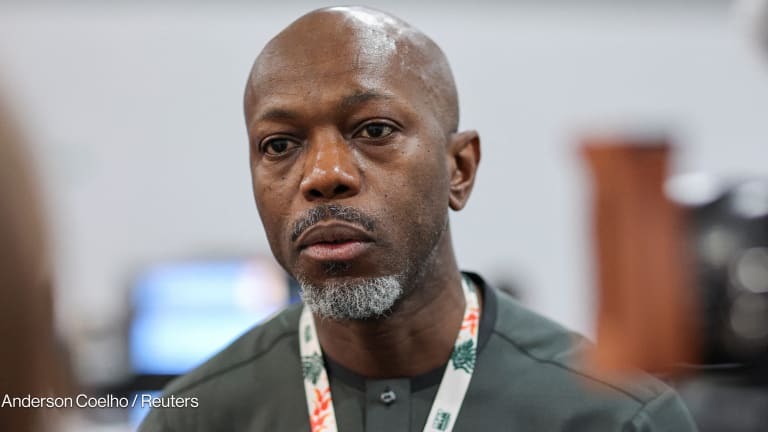
The past two months have been devastating for the countries falling within the tropics. Flooding has affected swathes of West Africa and Asia, while we have just witnessed the worst hurricane in a generation in the Caribbean and Florida. This is, of course, nothing new for the areas that line the equator where exposure to these kinds of natural disaster are a given. But the series of tragedies we have seen this year must force us to look at what more can be done to protect often hugely vulnerable communities, in poor and often fragile states, against events that will clearly happen again.
In my country, Sierra Leone, we have only just begun to fully recover from the devastation of Ebola. Yet now the floods and resulting mudslides witnessed in Freetown in August are estimated to have killed approximately 1,000 people, with new incidents continuing. Flooding and mudslides are not new to Sierra Leone’s capital city. Its coastal position, surrounded by hills, and the highest annual rainfall in Africa, ensure that there is always a risk of incidents, especially during rainy season. There is also the realization that, as witnessed from the U.S., to Bangladesh, to Nigeria, climate change is also exacerbating the risks to communities already exposed to flooding and rising water levels.
But the knowledge that the city is a flooding risk makes this latest tragedy no easier to bear. Families, some of whom have already had to deal with loss from the Ebola outbreak, are now stealing themselves for more heartache. And yet the resilience shown once again by the people of Sierra Leone is astounding. Weeks after the worst of the flooding, people are already trying to rebuild their lives.
But the resilience of the people is not a solution to a problem we will face time and time again. The government, the private sector, and the international donor community need to collaborate and work out how best to protect cities such as Freetown and minimize the impact of inevitable future floods.
The city itself is symptomatic of a global trend in urbanization. Freetown is now home to 1.2 million people and has witnessed the rapid expansion of informal and unregulated housing, often into areas lying on or close to floodplains. This has increased the amount of people exposed to flooding. And as the city moves upwards into the heavily forested hills above Freetown, the resulting deforestation has both removed critical natural defences against flooding, while also destabilizing the land and making mudslides more likely. This has created a lethal cocktail of an increased number of people at risk of flooding and mudslides and a exacerbation of the factors that contribute to the floods themselves.
“The resilience of the people is not a solution to a problem we will face time and time again.”
—As a country, we must act to address these issues now. We need to develop better rules around urban planning and development and, crucially, ensure they are enforced. And we need to do more to protect some of the poorest communities in our country. As with other examples of flooding disasters seen this year, it is often the poorest, most marginalized communities who are most affected by floods. We must improve the resilience of these communities and ensure processes are in place to help people immediately after they happen.
Sierra Leone has once again been hit by tragedy, but I believe the country is in a better position now to address these challenges than it has been in the past. Whether it be the proactive roll out of free health care to mothers and newborns, or the coordinated response of the Ebola disaster, the current Sierra Leone government has proven that the state can intervene and protect the lives of its people.
Within this tragedy, there is an opportunity for the government to assess the challenges that Freetown’s expansion has created and work out a realistic plan for managing the next phase of development. The government’s collaboration with the mining sector to develop better infrastructure and better facilities for worker communities outside of the capital has proved that planning and infrastructure development can succeed. For example, in the mining communities within the Sierra Rutile mining concessions, not a single life was lost to Ebola as the health facilities and screening processes in place effectively combatted the outbreak. Why couldn’t such planning be focused on flood and mudslide mitigation?
A similarly strategic approach to donor engagement could also be followed. The World Bank has already doubled its aid funding to support the flood rehabilitation, but we can take a more long-term approach to collaboration with the donor community. Through the International Dialogue on Peacebuilding and Statebuilding’s “New Deal” initiative, we have the framework for a country-led, inclusive, and sustainable development plan that takes states like Sierra Leone from a position of continual fragility to stable development and resilience. By working with the international community and the private sector within such frameworks, we have the opportunity to strengthen Sierra Leone and ensure manageable crises like the recent floods do not have a disproportionate impact on our people.
I am an optimist about my country and its capacity to develop. Ebola halted what was one of the longest periods of ongoing economic growth and development the country has seen in a generation. The latest flooding has further threatened a return to that development trajectory, but I believe we will recover and honor the resilience shown by the citizens of Freetown.
Join the Devex community and access more in-depth analysis, breaking news and business advice — and a host of other services — on international development, humanitarian aid and global health.








